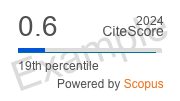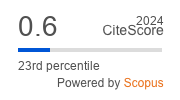Artificial intelligence in the prevention and diagnosis of cardiovascular diseases in Russia (literature review)
https://doi.org/10.29001/2073-8552-2025-40-1-28-41
Abstract
Aim: To assess work carried out in Russia over the past 5 years to identify the risks of developing cardiovascular diseases using artificial intelligence (AI) methods and technologies.
Materials and methods: A systematic review of the available literature over the past 5 years on the use of machine learning and knowledge representation methods in predicting the development and outcomes of cardiovascular diseases in Russia was carried out based on the Prisma methodology. 221 articles were analyzed.
Results and discussion: The result of the systematic review is an analysis of the presented methods of model building, which ones are most often used, and with the help of which metrics researchers evaluate the quality of the obtained model. Machine learning methods are used most frequently compared to knowledge-based methods (expert systems), 22 articles and 7 articles respectively. Analysing the machine learning methods used, it can be noted that the first 5 places among the methods used in Russia are occupied by neural networks, regression, decision tree, boosting and random forest. Among the models of knowledge representation, ontology and semantic networks, which are often used for structuring and analyzing complex data in various knowledge domains, turned out to be the most widespread in the presented works. Almost all researchers in their papers evaluated the created model on a test sample and considered numerical metrics: accuracy (accuracy of measurement), precision (accuracy of the measuring instrument), completeness (recall), specificity (specificity), sensitivity (sensitivity), AUC (area under the ROC curve), F-measure (F-measure). The discussion is a discourse on the use of different metrics to evaluate different model variants.
Conclusion: The results of the analysis of works using AI for the prevention and diagnosis of cardio-vascular diseases are summarized, and an assessment of their further application is given.
About the Authors
M. N. KovelkovaRussian Federation
Margarita N. Kovelkova, Senior Lecturer, Department of Medical Cybernetics and Informatics S.A. Gasparyan, MBF
1g, Ostrovityanova str., Moscow, 117997
E. G. Iakovleva
Russian Federation
Ekaterina G. Yakovleva, Cand. Sci. (Med.), Associate Professor, Department of Medical Cybernetics and Informatics S.A. Gasparyan, MBF
1g, Ostrovityanova str., Moscow, 117997
References
1. Kobrinsky B.A. Intelligent Recommender Systems for Medicine: Peculiarities and Limitations. Artificial intelligence and decision making. 2022;3;51–62. (In Russ.). https://doi.org/10.14357/20718594220304.
2. Kobrinsky B.A. Artificial intelligence systems in medical practice: state and prospects. Vestnik Roszdravnadzor. 2020;3;37–43. (In Russ.). https://doi.org/10.35576/2070-7940-2020-3-37-43
3. Acosta-García H., Ferrer-López I., Ruano-Ruiz J., Santos-Ramos B., Molina-López T. Computerized clinical decision support systems for prescribing in primary care: main characteristics and implementation impact – protocol of an evidence and gap map. Syst. Rev. 2022;11(1):283. https://doi.org/10.1186/s13643-022-02161-6
4. Alowais S.A., Alghamdi S.S., Alsuhebany N., Alqahtani T., Alshaya A.I., Almohareb S.N. et al. Revolutionizing healthcare: the role of artificial intelligence in clinical practice. BMC Med. Educ. 2023;23:689. https://doi.org/10.1186/s12909-023-04698-z
5. Gusev A.V., Gavrilov D.V., Korsakov I.N., Serova L.M., Novitsky R.E., Kuznetsova T.Y. Prospects for the use of machine learning methods for predicting cardiovascular disease. Medical doctor and IT. 2019;3:41–47 (In Russ.). URL: https://www.vit-j.ru/upload/iblock/14f/gfw1lvkmrwgssdxfjcm9c56pdx1h0460/vit_2019_03_05.pdf (07.08.2024).
6. Gusev A.V., Korsakov I.N., Gavrilov D.V., Serova L.M., Novitsky R.E., Kuznetsova T.Yu. et al. WEBIOMED. Model for predicting the development of cardiovascular diseases within 10 years. URL: https://webiomed.ru/media/predict_models_pdf_path/WML.CVD.FRS_-Passport_GCJRncw.pdf (08.08.2024).
7. Gavrilov D.V., Serova L.M., Korsakov I.N., Gusev A.V., Novitsky R.E., Kuznetsova T.Yu. et al. Cardiovascular diseases prediction by integrated risk factors assessment by means of machine learning. Vrach. 2020;31(5):41–46. (In Russ.). https://doi.org/10.29296/25877305-2020-05-08
8. Pushkin A.S., Shulkin D., Borisova L.V., Akhmedov T.A., Rukavishnikova S.A. Algorithm to stratify the risk of myocardial infarction in patients with acute coronary syndrome at primary examination. Klinicheskaya Laboratornaya Diagnostika (Russian Clinical Laboratory Diagnostics). 2020;65(6):394–400. (In Russ.). http://dx.doi.org/10.18821/0869-2084-2020-65-6-394-400
9. Belozerova E.V., Danilov A.V., Isaenkova E.A., Kalinina L.B., Manerova O.A., Usov Y.I. Prediction of hypertensive disease development using machine learning models in the subsystem of remote cardiac monitoring. Health Care Manager. 2022;2:76–84. (In Russ.). https://doi.org/10.21045/1811-0185-2022-2-76-84
10. Bogdanov L.A., Komossky E.A., Voronkova V.V., Tolstosheev D.E., Martsenyuk G.V., Agienko A.S. et al. Prototyping neural networks to evaluate the risk of adverse cardiovascular outcomes in the population. Fundamental and Clinical Medicine. 2021;6(4):67–81. (In Russ.). https://doi.org/10.23946/2500-0764-2021-6-4-67-81
11. Bolodurina I.P., Nazarov A.M., Kicha D.I., Zabrodina L.S., Zhigalov A.Yu. Development of a Model for Control the Flow of Patients with Cardiovascular Diseases Using Data Mining Methods. Bulletin of the South Ural State University. Ser. Computer Technologies, Automatic Control, Radio Electronics. 2020,20(2):105–115. (In Russ.). https://doi.org/10.14529/ctcr200210
12. Geltser B.I., Shakhgeldyan K.I., Nazarov D.A., Vetrova O.O., Kotelnikov V.N., Karpov R.S. Machine learning methods in assessing the risks of target organ damage in masked hypertension. Kardiologiia. 2020;60(5):107–114. (In Russ.). https://doi.org/10.18087/cardio.2020.5.n883
13. Nikanorova M.L., Aldokhina Yu.A., Pichugin Yu.A. Application of Data Mining Methods for the Diagnosis of Arterial Hypertension in Rapid Miner. Regional Informatics (RI-2020). 2020;2:131–133. (In Russ.).
14. Golukhova E.Z., Keren M.A., Zavalikhina T.V., Bulaeva N.I., Akatov D.S., Sigaev I.Yu. et al. Potential of machine learning methods in operational risk stratification in patients with coronary artery disease scheduled for coronary bypass surgery. Russian Journal of Cardiology. 2023;28(2):5211. (In Russ.). https://doi.org/10.15829/1560-4071-2023-5211
15. Gorbachenko V.I., Potapov V.V., Zenin O.K., Milytykh I.S., Gribkov D.N. Neural Network Model for Early Diagnosis of Chronic Heart Failure. Artificial Intelligence and Decision Making. 2021;3:88–97. (In Russ.). https://doi.org/10.14357/20718594220309
16. Demchenko M.V., Firyulina M.A., Kashirina I.L. Development of a health information system with decision support elements in cardiology. International Research Journal. 2021;(8(110)):69–76. (In Russ.). https://doi.org/10.23670/IRJ.2021.110.8.010
17. Druzhilov M.A., Kuznetsova T.Yu., Gavrilov D.V., Gusev A.V. Verification of subclinical carotid atherosclerosis as part of risk stratification in overweight and obesity: the role of machine learning in the development of a diagnostic algorithm. Cardiovascular Therapy and Prevention. 2022,21(7):3222. (In Russ.). https://doi.org/10.15829/1728-8800-2022-3222
18. Kashirina I.L., Firyulina M.A., Bondarenko Yu.V., Desyatirikova E.N., Efimova O.E., Chernenkaya L.V. Identification of risk factors for mortality after myocardial infarction using machine learning methods. Proceedings of the XXIV International Conference on Soft Computing and Measurements, 2021:316–320. (In Russ.).
19. Leonov Yu.A., Tsareva G.V., Terekhov M.V., Grishina V.V. Application of Data Mining Methods for Identifying Coronary Heart Disease. System analysis, management and information processing Bulletin of Tula State University. Technical Sciences. 2022;7:171–178. (In Russ.). https://doi.org/10.24412/2071-6168-2022-7-171-179
20. Makarikhin A.V., Nemkov A.G., Reitblat O.M., Egorov D.B. Development of a predictive model of myocardial infarction based on machine learning technologies. Journal of new medical technologies. 2021;28(4):103– 106. (In Russ.). https://doi.org/10.24412/1609-2163-2021-4-103-106
21. Mishkin I.A., Sakharov A.A. Study of the use of machine learning algorithms in assessing the risk of cardiovascular disease. Cardiology. 2021;60(7):15–24. (In Russ.). https://doi.org/10.14357/20718594220702
22. Nevzorova V.A., Brodskaya T.A., Shakhgeldyan K.I., Geltser B.I., Kosterin V.V., Priseko L.G. Machine learning for predicting 5-year mortality risks: data from the ESSE-RF study in Primorsky Krai. Cardiovascular Therapy and Prevention. 2022;21(1):2908. (In Russ.). https://doi.org/10.15829/1728-8800-2022-2908
23. Nevzorova V.A., Plekhova N.G., Priseko L.G., Chernenko I.N., Bogdanov D.Y., Mokshina M.V. et al. Machine learning for predicting the outcomes and risks of cardiovascular diseases in patients with hypertension: results of ESSE-RF in the Primorsky Krai. Russian Journal of Cardiology. 2020;25(3):10–16. (In Russ.) https://doi.org/10.15829/1560-4071-2020-3-3751
24. Ovcharenko E.A., Klyshnikov K.Yu., Kutikhin A.G., Frolov A.V. Machine learning in the problem of adverse cardiovascular events prognosis in patients after coronary artery bypass surgery. Clinical and Experimental Surgery. Petrovsky Journal. 2023,11(3):16–28. (In Russ.). https://doi.org/10.33029/2308-1198-2023-11-3-16-28
25. Plekhova N.G., Nevzorova V.A., Chernenko I.N., Priseko L.G., Stepanyugina A.K. Predicting the outcomes and risks of cardiovascular diseases using machine learning. Proceedings of the XXIV International Conference on Soft Computing and Measurements. 2020:305–309. (In Russ.). EDN: PINICI
26. Runova K.V., Yurin A.A. Classification of cardiovascular diseases using instrumental information processing methods based on various machine learning methods. Colloquium-journal. 2019;13-3(37):115–120. (In Russ.).
27. Абдуалимов Т.П., Обрезан А.Г. Выявление поражения коронарных артерий при помощи алгоритмов глубокого обучения. Кардиология: новости, мнения, обучение. 2021,9(2):9–13. https://doi.org/10.33029/2309-1908-2021-9-2-9-13 Abdualimov, T.P., Obrezan, A.G. Detection of coronary artery disease using deep learning algorithms. Kardiologiya: novosti, mneniya, obuchenie. [Cardiology: News, Opinions, Training]. 2021,9(2):9–13. (In Russ.). https://doi.org/10.33029/2309-1908-2021-9-2-9-13
28. Kashirina I., Firyulina М. Building models for predicting mortality after myocardial infarction in conditions of unbalanced classes, including the influence of weather conditions. CEUR Workshop Proceedings. 2020;2790:188–197. URL: https://ceur-ws.org/Vol-2790/paper18.pdf (07.08.2024).
29. Demchenko M.V., Kashirina I.L. The development of the atherosclerosis diagnostic models under conditions of unbalanced classes. Journal of Physics Conference Series. 2020;1479(1):012026. https://doi.org/10.1088/1742-6596/1479/1/012026
30. Gribova V.V., Okun D.B., Shalfeeva E.A. Semantic models for assessing the influence of complex factors on disease development. Ontology of designing. 2021;11(4):464–477. (In Russ.). https://doi.org/10.18287/2223-9537-2021-11-4-464-477
31. Grigoriev O.G., Kobrinsky B.A., Blagosklonov N.A., Ginzburg B.G. Recommendation intelligent system for chronic disease risk management. Information Technology and Computational Systems. 2023;2:27–37. (In Russ.). https://doi.org/10.14357/20718632230203
32. Vorobiev A.P., Vorobyov P.A., Oparin I.S., Vorobyev M.P. Identification of chronic non-communicable diseases in elderly patients using the MEDICASE AI system. Health Care Standardization Problems. 2019;11– 12:42–49. (In Russ.). https://doi.org/10.26347/1607-2502201911-12042-049
33. Gribova V.V., Geltser B.I., Shakhgeldyan K.I., Petryaeva M.V., Shalfeeva E.A., Kosterin V.V. Hybrid technology of risk assessment and prognosis in cardiology. Medical doctor and information technology. 2022,3:24– 35. (In Russ.). https://doi.org/10.25881/18110193_2022_3_24
34. Gribova V.V., Petryaeva M.V., Shalfeeva E.A. Cloud Decision Support Service in Cardiology Based on Formalized Knowledge Siberian Journal of Clinical and Experimental Medicine, 2020; 35-4, 32-38. (In Russ.). DOI: 10.29001/2073-8552-2020-35-4-32-38.
35. Kovelkova M.N. Intelligent system for monitoring the risk of hyperten sion. Journal of New Medical Technologies. 2020;27(4):92–97. (In Russ.). https://doi.org/10.24411/1609-2163-2020-16720
36. Petryaeva M.V. Semantic representation of the knowledge base about diseases for decision support service in cardiology. Proceedings of the XIV International Scientific Conference ‘System Analysis in Medicine’ (SAM 2020), ed. by V.P.Kolosov; Blagoveshchensk, 2020:78–81. (In Russ.). https://doi.org/10.12737/conferencearticle_5fe01d9be1fc59.34271723
37. Kobrinskii B.A., Kadykov A.S., Poltavskaya M.G., Blagosklonov N.A., Kovelkova M.N.. The principles of the operation of an intellectual system of dynamic risk control and the formation of health recommendations. Russian Journal of Preventive Medicine. 2019;22(5):78–84. (In Russ.). https://doi.org/10.17116/profmed20192205178
38. Gusev A. V., Gavrilov D. V., Novitsky R. E., Kuznetsova T. Yu., Boytsov S. A. Improvement of cardiovascular risk assessment using machine learning methods. Russian Journal of Cardiology. 2021;26(12):4618. (In Russ.). https://doi.org/10.15829/1560-4071-2021-4618
Review
For citations:
Kovelkova M.N., Iakovleva E.G. Artificial intelligence in the prevention and diagnosis of cardiovascular diseases in Russia (literature review). Siberian Journal of Clinical and Experimental Medicine. 2025;40(1):28-41. (In Russ.) https://doi.org/10.29001/2073-8552-2025-40-1-28-41





.png)





























